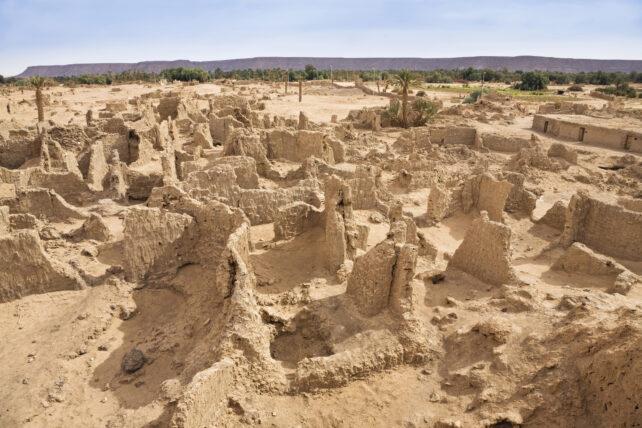In the heart of what now appears as an endless sea of sand, the Sahara Desert once whispered a dramatically different story. Millennia ago, this arid expanse was a vibrant, verdant landscape teeming with life, rich vegetation, and diverse ecosystems that harbored secrets of human evolution. Recent archaeological and paleontological findings suggest that this seemingly inhospitable terrain was not just a barren wasteland, but a cradle of human existence, nurturing a mysterious lineage whose traces challenge our understanding of early human migration and adaptation. Where windswept dunes now reign supreme, prehistoric rivers once flowed, and verdant grasslands supported complex human communities, revealing a narrative far more nuanced than the current stark desert landscape implies. Archaeological discoveries have unveiled a fascinating transformation of the world’s largest desert, revealing a landscape dramatically different from today’s arid expanse. Approximately 10,000 years ago, the Sahara pulsed with vibrant ecosystems, teeming with life and supporting complex human settlements long before conventional past narratives.
Prehistoric evidence suggests the region was a verdant paradise, characterized by sprawling grasslands, abundant water sources, and diverse wildlife. Lush vegetation covered terrain now dominated by endless sand dunes, creating an environment that sustained intricate human societies with complex survival strategies.
Cutting-edge genetic research indicates the presence of a previously unknown human lineage inhabiting this prehistoric paradise. Researchers have uncovered archaeological sites revealing advanced tool-making techniques, intricate social structures, and remarkable adaptability that challenged existing understanding of early human migrations.
Sophisticated analysis of ancient DNA and archaeological remnants suggests these inhabitants developed unique survival mechanisms perfectly synchronized with the dynamic environmental conditions. Their technological innovations allowed them to navigate and thrive in a landscape continuously transitioning between wet and dry periods.
Geological studies demonstrate periodic climate shifts transformed the Sahara from a green corridor connecting Africa’s northern and sub-Saharan regions into the harsh desert we recognize today. These transformations occurred over thousands of years, creating complex ecological dynamics that shaped human evolutionary paths.
Radiocarbon dating and advanced imaging technologies have provided unprecedented insights into these ancient societies. Petroglyphs and rock paintings discovered across the region depict sophisticated hunting techniques, complex social interactions, and detailed representations of local fauna that once populated the landscape.
Interdisciplinary research combining paleontology, archaeology, and genetic studies continues to unravel the mysteries of this enigmatic human lineage. Each discovery challenges previous assumptions about human migration patterns, technological advancement, and adaptation to extreme environmental changes.
The narrative emerging from these investigations suggests a profound interconnectedness between human societies and their environmental contexts. The Sahara’s transformation represents more than a geological phenomenon—it embodies a complex story of human resilience, migration, and evolutionary adaptation.
Contemporary scientists remain fascinated by the potential stories hidden beneath layers of sand, anticipating future technological breakthroughs that might reveal even more about this mysterious human lineage and their remarkable existence in what was once a thriving, green ecosystem.
The ongoing research promises to continuously reshape our understanding of human prehistory, challenging long-held beliefs about early human societies and their remarkable capacity to survive and flourish in challenging environments.



Elon Musk Brags About How Much He Controls Trump